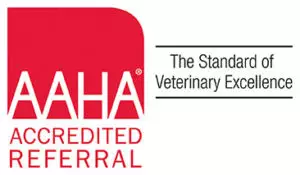Does My Dog Need a Tracheal Stent?
Tracheal collapse is a common problem in small-breed dogs, and can lead to severe respiratory distress without appropriate treatment. In some cases, surgery is necessary to correct the problem and ensure the affected dog can breathe properly. Our team of internationally recognized veterinary surgical experts at Long Island Veterinary Specialists is able to perform this technically demanding procedure necessary for your dog with tracheal collapse.
What is tracheal collapse in dogs?
The trachea (i.e., windpipe) is the fairly rigid tube made up of C-shaped cartilaginous rings that connects the nose, mouth, and throat to the lungs, spanning the neck and extending into the chest. The open end of each C (i.e., the tracheal membrane) faces the dog’s back and is composed of the trachealis muscle and connective tissue. Factors that contribute to tracheal collapse include:
- Tracheomalacia — Tracheomalacia causes the cartilage rings to weaken and become soft and spongy, causing the tracheal membrane to loosen and be sucked into the airway during breathing. Tracheal collapse can affect the trachea at any point in the neck or chest. When the neck portion is affected, the dog experiences problems during inspiration, and when the chest portion is affected, they experience exhalation problems. The underlying cause of this distressing disease is not fully understood, but is likely multifactorial, involving genetic, nutritional, and allergic triggers.
- Inflammation — When the trachea collapses, inflammation occurs, causing increased tracheal secretions, which promotes more coughing, which generates more inflammation. The inflammation produces enzymes that further soften the tracheal cartilage, exacerbating the tracheal collapse.
What dogs are at risk?
Small-breed dogs are most commonly affected, and poodles, Yorkshire terriers, Pomeranians, and Chihuahuas are at highest risk. Dogs can be affected at any age, but the condition typically manifests in middle-aged and older dogs. Other risk factors include:
- Obesity — Carrying excess weight can exacerbate breathing difficulties in affected dogs.
- Respiratory disease — Respiratory infections, such as kennel cough, can complicate the condition.
- Respiratory irritants — Dogs who live in a household with a smoker are more likely to exhibit signs.
- Heart enlargement — The enlarged heart of a dog with a heart condition can press on the trachea, exacerbating the problem.
Diagnosis of tracheal collapse in dogs
The most common tracheal collapse sign is a persistent, dry hacking cough sometimes described as a goose honk cough. The cough may worsen when the dog is excited, during hot or humid weather, after eating or drinking, or when the trachea is pressured (e.g., from a collar). Affected dogs may also experience exercise intolerance, noisy or difficulty breathing, and fainting. When tracheal collapse is suspected, common diagnostics include:
- Blood work — Our veterinary team may perform a complete blood count and a biochemistry profile to rule out an infectious agent and assess your dog’s overall health. In addition, we will assess your dog’s liver function, since many dogs with a collapsing trachea have concurrent liver disease.
- X-rays — We can evaluate tracheal collapse on neck and chest X-rays, although the condition is not always visible.
- Fluoroscopy — Fluoroscopy is an imaging technique that allows our veterinary team to dynamically assess your dog’s trachea during inhalation and exhalation, and to document the location and severity of collapse.
- Computed tomography (CT) — CT is another imaging modality that can be used to document tracheal collapse.
- Endoscopy — Endoscopy allows our veterinary team to look inside your dog’s trachea. During the exam, we may also take samples for culture and analysis.
- Echocardiogram — In some cases, our veterinary team may recommend an ultrasound of your dog’s heart to assess the situation.
Medical management for tracheal collapse in dogs
Many dogs affected by tracheal collapse respond well to medical management, particularly those with a mild collapse. Treatment, which is typically multi-faceted, involves:
- Weight control — If the dog is overweight, losing the excess pounds can significantly improve their condition.
- Removing irritants — If the dog’s household includes a smoker, the dog’s condition will improve if the smoker quits.
- Antibiotics — Dogs who have a collapsed trachea are at higher risk for infection, since they can’t efficiently clear pathogens from their lower respiratory tract, and they may need antibiotics to help clear the infection.
- Cough suppressants — Medications that help reduce your dog’s cough may be helpful.
- Steroids — Steroids are frequently used on a short-term basis to help reduce mucus and decrease inflammation.
- Oxygen therapy — In severe cases, your dog may need oxygen therapy to ensure they are well oxygenated.
Surgical management for tracheal collapse in dogs
If medical management does not produce satisfactory results, tracheal stenting may be beneficial. Tracheal stenting is a non-invasive procedure that involves placing a self-expanding, cylindrical prosthesis to help keep the airway open. The procedure can often dramatically improve the dog’s quality of life, and improvement is typically seen in 90% of patients. Patients are typically in the hospital for only one day. Complications are rare and include issues such as stent migration, stent fracture, and infection. Care following a tracheal stenting procedure is minimal and includes:
- Giving medications — While the procedure improves most clinical signs, continued medical management is typically necessary.
- Losing weight — If your dog is overweight, it is beneficial to have them lose the excess pounds. Our staff can help with this.
- Recheck appointments —After a tracheal stent procedure, your dog will need several monthly follow-up examinations to ensure their condition is not still progressing.
Tracheal stenting can significantly improve your dog’s quality of life if they have moderate or severe tracheal collapse, because maintaining a patent airway helps them breathe better and reduces coughing. If you think your dog could benefit from tracheal stenting, contact Long Island Veterinary Specialists, so we can determine if your dog is a good candidate for the procedure.


